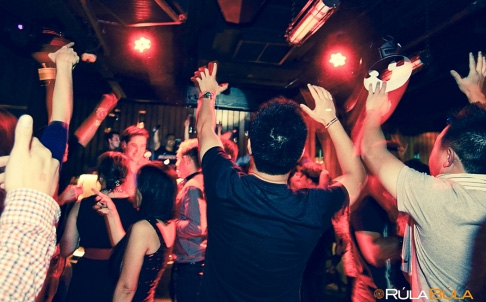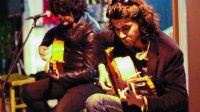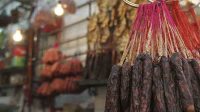It’s a Friday afternoon and Cathal Kiely is getting ready for a busy weekend at the clutch of watering holes that he owns in Central – Solas, Killa, Shore and Rula Bula. One problem the Irishman is relieved he will no longer have to deal with is that of young teens slipping in for drinks.
That’s because he has hired a private security firm to keep them out.
Kiely, who has been in the local food and beverage business for eight years, used to have a headache with teenage drinkers.
“We’ve caught kids as young as 15 trying to get into the bar.”
Now, he says, he spends more than HK$1 million a year on security, whose main purpose is to “manage the door and catch underage drinkers”.
But while he is fending them off in his establishments, teenagers are picking up bottled cocktails and beer from nearby convenience stores, and Kiely says the presence of inebriated youngsters is impossible to miss in nightlife areas in Central.
Several times he has had to help children who had passed out on the street.
“They’re roaming around Lan Kwai Fong. It doesn’t look good on an international stage to have gangs of kids drinking,” he says. “We have a civic responsibility as a society to ensure this shouldn’t continue.”
Underage drinking is a problem all over the world, although Hong Kong is luckier in many ways. Asian cultural norms of living at home until marriage and not drinking to excess mean that the proportion of underage binge drinkers here is lower than in cities in the United States and Europe.
But, like Kiely, groups working with young people observe a worrying rise in Hong Kong.
“It’s true that in the past five to 10 years more teenagers are drinking,” says Chan Wing-kin, a social worker and supervisor at The Boys’ and Girls’ Clubs Association of Hong Kong.
Many teens take festivities over Halloween, New Year or events such as the Rugby Sevens as occasions to let loose. Youth workers have found underage girls drunk to the point of tears at the Sevens, boys in a stupor or throwing up.
This is why local charity Kely Support Group They launched their Save our Sevens drive in 2012. The annual initiative recruits volunteers to encourage young people to enjoy the sporting carnival sober and safely.
In a 2008 survey by the narcotic division of the Security Bureau, 65 per cent of secondary students admitted that they drank alcohol. However, there is a dearth of long-term research on underage drinking in Hong Kong, and the lack of credible statistics has been a major hindrance for groups tackling the issue.
“We do not have specific figures and that has been very, very tough,” says Chung Tang, executive director of Kely Support Group, which helps young people with substance abuse problems.
“We have consulted with the Department of Health and have really been advocating for more resources, not just for us but for several other community groups that are trying to look at this issue because we need longitudinal studies, we need stats … We don’t have any kind of index in Hong Kong for young people [who abuse alcohol].”
Historically, government-funded research on substance abuse has focused on alcoholism among adults, or drugs.
“Policymakers say they see the drug issue as more serious than the drinking issue but we see it is just as serious in many ways,” Tang says.
Consider the experience of 15-year-old Mary. She has been fighting with her boyfriend constantly.
When she turns to her friends for help, bottled vodka cocktails from a nearby convenience store help open her up. Soon the talks become secondary; her problems fade from mind when she drinks, even if alone. Vodka, wine, beer – she drinks until the pain is bearable or, more often, until she passes out.
Then there are teens like Brian. A shy boy from a middle-class family, the 17-year-old doesn’t even like to drink; he can’t stand the taste of alcohol, he says. Yet, three days a week he is out with his friends drinking to excess.
He insists his friends don’t pressure him but they all like to drink and he doesn’t want to “lose face”. The last thing he wants is to be seen as a party pooper.
Anyway, he doesn’t see the harm: “My parents and all my friends’ parents drink at home so it just seems normal to be drinking.” The general attitude in Hong Kong, especially among expats, seems to be: “What’s the big deal? Young people always drink; they just want to have a little fun.”
But Victoria Wong, the communications and development coordinator for Kely Support Group, argues it is impossible to overstate the potential dangers of binge drinking on youngsters.
“If you do binge drink to the point where you pass out, that’s because the alcohol has affected your central nervous system,” she says.
Dr Anisha Abraham, a paediatrician specialising in adolescent medicine, elaborates. Because teenagers’ brains are still developing, drinking can inflict irreversible changes in the nervous system, as well as other organs.
“They’re risking liver toxicity, heart problems and memory loss,” she says. “Also, youth have a much higher likelihood of getting involved in risky sexual activity and using other drugs when judgment is impaired.”
When outreach workers speak to teens who abuse alcohol, Chung says, they find a few recurring factors: peer pressure, stress at school, boredom and emotional pain due to problems at home or relationships.
“Hong Kong is a difficult city to be in, especially for young people. There’s pressure at home, pressure at school and pressure in the community. This is a society that really values young people who make good grades. When there’s young people that can’t hit those standards, it is very difficult for them.”
Sheer boredom is one of the most common reasons teenagers give for drinking, says Chung, who calls for more youth initiatives.
“There are not a lot of events for them to go to; there are not a lot of community centres that they can be a part of … and they are yearning for more options.”
However, Chan of the Boys and Girls Clubs Association doesn’t buy into the notion that youth alcoholism can be attributed to a lack of activities.
“In a big city like Hong Kong there are many things they can do.”
Chan believes the root of risky behaviour in teens often goes deeper. “It’s more emotional, relational problems with their friends, peers, parents, or teachers – human factors.”
Teens find that drinking gives them a way to discuss their emotions more easily in a social setting, although they should use other activities like going to the movies to talk with friends in a supportive environment, Chan says.
The lack of regulation on sales of alcohol to young people, however, makes drinking a convenient crutch for teenagers.
Sales are largely governed under liquor licensing rules that prohibit clubs, bars, restaurants and organisers of public events from serving anyone under the age of 18. But the police say “there is no specific law or a regulation that governs underage drinking”.
So there is nothing to stop them from buying alcohol from a supermarket or convenience store and drinking it elsewhere, often on the street.
This legislative loophole has enabled youngsters to turn to convenience stores into their watering holes. In nightlife districts, the shelves in such stores are packed with cheap booze, energy drink and mixers, and the area by the cash registers – usually reserved for impulse buys – is crowded with premixed shots.
Bikal Gauchan, manager of Club 97, blames the growing presence of young drinkers on more convenience stores opening in the area.
A new 7-Eleven outlet that just opened next to the LKF Hotel means the tiny area around Lan Kwai Fong is now served by four stores, and on weekend nights they are invariably surrounded by underage drinkers.
“Underage people can get drinks quite easily so they’re … drinking like crazy and throwing their stuff everywhere,” Gauchan says.
If he were a parent, he says, he would be worried. Parents “need to take care of their children coming to Lan Kwai Fong to party when they are not of legal drinking age”.
But a spokesman from 7-Eleven argues such criticisms are off base.
“7-Eleven prohibits consumption of alcohol in all our stores,” he says. “The company policy is not to sell alcoholic beverages to customers under the age of 18. This is not a legal requirement but is applied to all the stores.”
Last Friday night, a staffer at the newest Lan Kwai Fong branch confirmed that it is their policy not to serve alcohol to anyone under 18. However, employees do not check IDs and gauge a customer’s age simply by sight.
Even as we spoke, a group who looked underage were engaged in a drinking contest in the store, to see who could finish their bottle of Bacardi Ice the fastest.
None of the employees seemed to notice.
One former underage drinker is no stranger to the 7-Elevens in the area. Now 21 years old, she started drinking when she was 16 and, by 17, she was going out four times a month, mostly on weekends.
“If I went out and it was a weekend, I would get drunk,” she says.
She and her friends would also hit the clubs in Wan Chai or Central to “take advantage of ladies nights”, when they can drink for free.
Now a restaurant receptionist, she looks back on those days fondly. Most parents, however, would be horrified by the world she describes: youngsters getting so drunk they would fight on the streets until the police got involved or worse.
“You have to be careful,” she says. “I’ve been roofied [served a drug-spiked drink] two or three times, but I was with friends and they could carry me home.”
She finds there are a lot more young people out on the town these days and drugs have become more prevalent. It is an alarming combination. “A lot of kids end up doing drugs with alcohol because it is so much easier to get now.”
WHERE THE LAW STANDS ALCOHOL:
Britain: It is illegal to sell alcohol to someone under 18 anywhere. It is also against the law for someone under 18 to buy alcohol. A person 16 or 17 years old can legally consume, but not buy, beer, wine, or cider with a meal at licensed premises if they are accompanied by an adult. It is legal for children over five to drink alcohol in private.
Mainland China: As of 2006, it is illegal for people under the age of 18 to consume alcohol and illegal for vendors to sell alcoholic beverage to anyone under 18. However, the law is unevenly enforced.
Hong Kong: No one under 18 can consume or purchase alcohol at venues with liquor licences (bars, clubs and so on). There is no restriction on the sale of alcoholic beverages by retailers (supermarkets, convenience stores and the like) to people under 18 and there are no specific regulations that address underage drinking.
Singapore: It is illegal for anyone under 18 to consume or purchase alcohol. Anyone found creating a scene in the public places under the influence of alcohol can face large fines and imprisonment of up to three months.
United States: Laws relating to the private consumption of alcohol vary from state to state, but it is illegal in all 50 states for people under 21 to buy or publicly possess alcohol.



